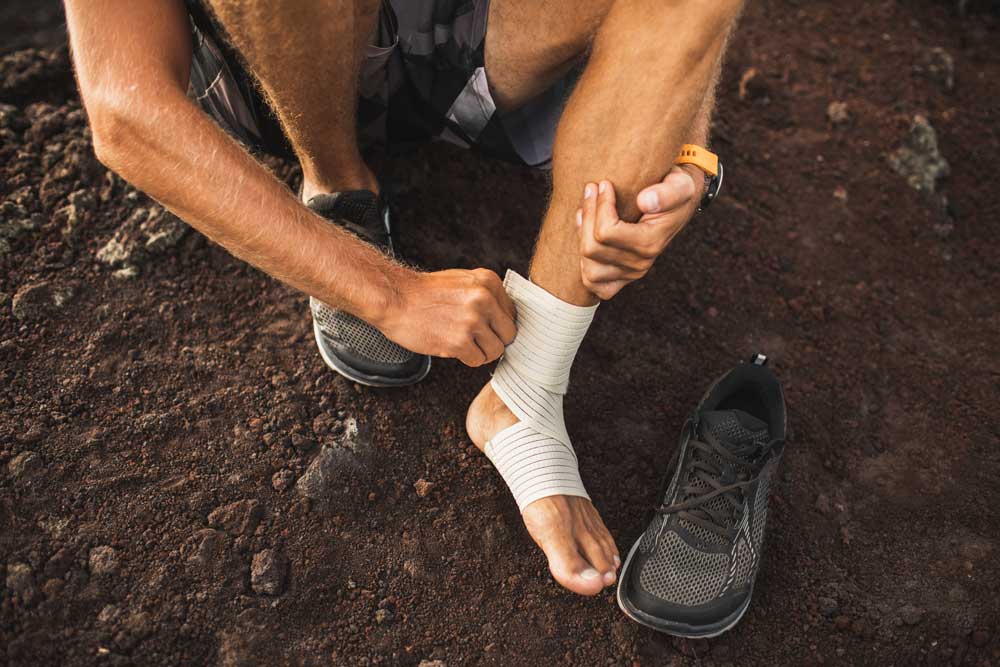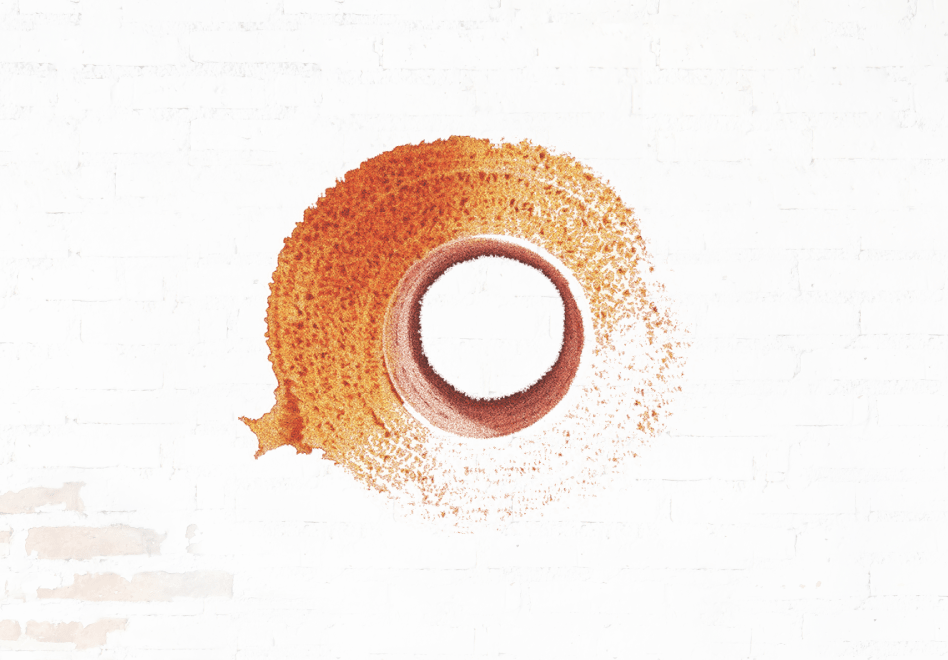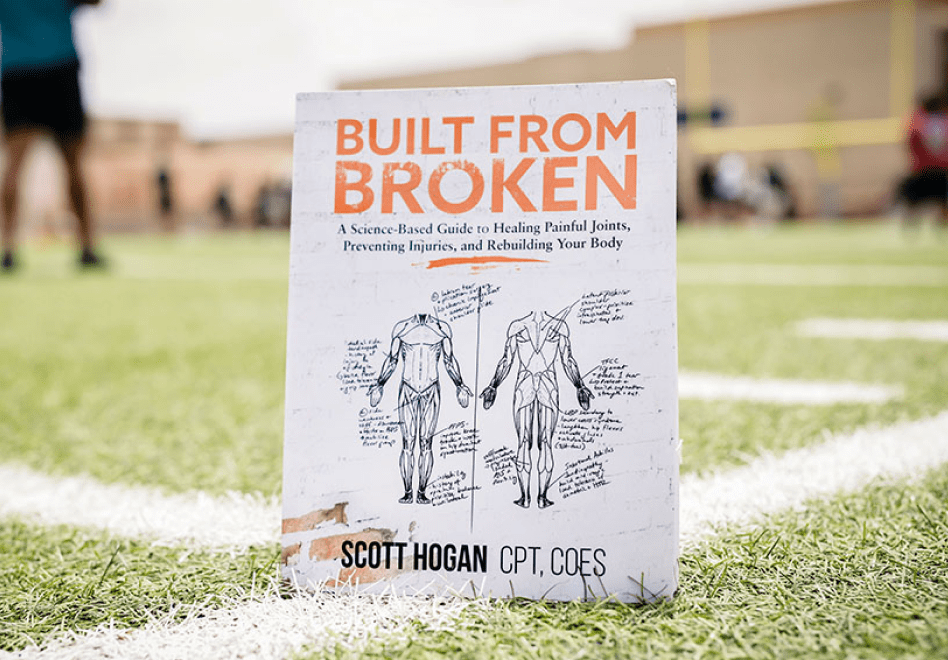
Be built (to last).
The right supplements can help you recover naturally and build a resilient body.

Supplement Quiz
Take this short quiz to discover the perfect supplements for your needs and goals.
About SaltWrap

Built from Broken
Get the best-selling book from SaltWrap founder, Scott Hogan, and start rebuilding today.
Collagen After Surgery: When To Take It, When To Avoid It, and How It Supports Recovery
By Scott Hogan, ACE-CPT, COES
Is collagen supplementation after surgery a good idea?
This is a question I get a lot. So a dedicated post is long overdue.
When I dug into the scientific literature and checked the pulse of the internet on this topic, I was surprised to see that the vast majority of articles were:
-
Almost universally promoting collagen supplementation after surgery – without any context or specificity to the type of surgery (let alone considerations for second-order effects, like keloid scar formation or scar tissue formation within joint capsules, which could negatively impact physical therapy outcomes).
-
Written by companies selling collagen – not medical doctors or physical therapists. (To be fair, I’m in this camp – but I have no problem telling you NOT to take something when the evidence clearly indicates there is a time and place to avoid it.)
-
Conspicuously lacking any clinical support or links to studies supporting their claims.
In other words, the blogosphere is a giant echo chamber where everyone is saying “Collagen is great! Take it before and after surgery! Heck, consider putting some in your IV drip during surgery!”
Anytime I see this type of universal, unquestioned consensus, I get suspicious.
I have personal — and professional — experience with surgeons and physical therapists who actually apply this stuff versus merely writing about it and pontificating about the conclusions from journal articles.
Not to thumb my nose as clinical data, but when one of the top physical therapists in the country says that patients who take collagen after hip surgery see increased scar tissue formation and restricted movement that hurts physical therapy outcomes, it makes sense to pay attention. More on that in a moment.
First, let’s look at the distinction in collagen supplementation impacts based on two primary surgery types. Though SaltWrap’s main focus is joint and musculoskeletal-related surgical outcomes, let’s start with the surface-level stuff: skin.

Collagen Supplementation for Skin and Cosmetic Surgeries
Here’s the good news.
Taking collagen after cosmetic procedures (or other surgeries with a substantial wound site) improves collagen deposition and wound healing outcomes.1
In fact, having too little collagen available for the rebuilding process will result in sunken “atrophic scarring.” But too much collagen could result in a raised keloid scar — or hypertrophic scar.
That’s because collagen is the building block of virtually every repair process, whether within your joints or on the surface of your skin. The same process that helps rebuild tendon structures also increases dermal tissue remodeling rates (for better or worse).
So, while long-term studies have shown that collagen supplementation does improve skin health, I can’t honestly say that you should take collagen after surgery merely for its skin-healing benefits.2
There is a personal variable at play here as well. Some people are more prone to raised keloid scarring. If you’ve ever cut yourself and noticed that the wound heals with a raised scar (feels like a bump as you run your hand over it), you are likely more prone to keloid scarring and may want to avoid collagen supplementation in the first few weeks after surgery when most of the skin healing process takes place.
Beyond the exterior scarring, there is internal scar tissue to think about. For example, in breast reconstruction surgeries, there is a positive correlation between the Type I to Type III collagen ratio and scar formation.3 With this surgery, some scarring is inevitable. But excessive scarring can create pain and irritation, unwanted cosmetic outcomes, and even mobility restrictions. Avoiding any supplement (including collagen) that might increase scarring makes sense.
So, we have some potential benefits and potential risks.
Potential skin-related benefits of taking collagen after surgery:
-
Increased collagen production. Collagen supplements give your body the building blocks needed to produce new collagen and potentially accelerate wound healing.
-
Reduced inflammation. Studies suggest collagen has anti-inflammatory properties, which could be beneficial for wound healing and scar formation.4
-
Improved skin elasticity. While the effects on scar tissue specifically are unclear, collagen plays a role in skin elasticity and maintaining skin health after surgery.
Potential risks of taking collagen after surgery:
-
Increased scarring
-
Increased collagen buildup and keloid formation
-
Other: interactions with medication, changes in blood thinning or blood pressure, worsening of already present skin conditions like acne. (This is not an exhaustive list.)
It’s a mixed bag. Fortunately, the research around supplementing with collagen after musculoskeletal surgeries provides us with a commonsense path forward for both surgery types.
Collagen Supplementation for Musculoskeletal Repair Surgeries
This seems like a no-brainer.
We know that supplementing with collagen increases collagen biosynthesis (the creation of new collagen molecules in the body). There’s also evidence showing it can improve connective tissue repair in joint injuries, such as Achilles tendinopathy.5

So, by clear logic, we should take collagen after any surgery for a joint — knee, shoulder, wrist, etc. — or any body part, right?
Not so fast.
While collagen supplementation improves both the joint rebuilding process and physical therapy outcomes, we have to address the scar tissue problem again.
As I noted before, collagen will rebuild anything — tendons, bones, skin. It doesn’t care. It’s like a brick. And it’s happy to rebuild anything made of bricks.
Meaning, while taking collagen will likely help your knee or shoulder tendon (or ligament) heal faster after surgery, it can (and does) increase scar tissue formation at surgical and injury sites as well.
In this instance, the scarring poses less of a cosmetic problem and more of a mobility problem.
Too much scarring around the surgical site could impair the natural range of motion of the joint. And because your body’s natural “scar cleaning” process is based on movement, this means there is an elevated risk of counterproductive scarring in the first few weeks after surgery when you are immobilized (for example, if you are in a cast, sling, or brace).
I recently talked with physical therapist Bryan Graham, founder of Oceanside Physical Therapy in Stuart, FL. Bryan and his team at Oceanside comprise one of the country's top hip arthroscopy groups, where patients fly in from all over the world to get world-class physical therapy.6
When I asked Bryan about post-surgery collagen supplementation, he simplified the whole problem into an easy-to-understand solution:
“We’ve seen increased scar tissue that can limit mobility during those first few weeks of hip surgery,” Bryan told me.
(Due to its ball-and-socket structure, the hip joint is particularly susceptible to the formation of mobility-restricting scar tissue. This is because scar tissue formation can impede the extensive movement required for the femur to rotate successfully inside the hip capsule.)
“So, we tell our patients to wait until they start PT (physical therapy) before taking collagen. This way, the movement of PT helps prevent scar tissue build up where it shouldn’t be — and still allows the patient to benefit from the increased collagen deposition at the surgical site.”
And that’s the commonsense answer.

Ball and Socket Structure of the Hip Joint (Source: Wikimedia Commons)
The Commonsense Approach: How to Supplement With Collagen After Surgery
Post-surgery is a timespan that deserves special attention — mostly due to the scar tissue effects we’ve discussed so far. While the literature is clear that supplementing with collagen helps improve injury recovery outcomes, the science around collagen after surgery is more nuanced.
I recommend is simply waiting until you start physical therapy (or corrective exercise) to take collagen after surgery. Depending on the type of surgery, this usually means waiting anywhere from 4-6 weeks post-surgery to start taking it.
The start of physical therapy is an ideal time to begin taking collagen supplements.
Why?
At this stage, you're activating the mechanisms for clearing away dead or necrotic tissue which prevent unwanted scar tissue buildup. Davis' Law explains why and how this works: soft tissues like ligaments and tendons adapt their structure and form in response to mechanical stress. The movement stimuli you provide to the damaged areas signal your body where to deposit collagen (and where not to).
Think of the movement during physical therapy as shoveling a driveway during a snowstorm. While the snow (your body's ongoing collagen formation) keeps falling, continually clearing the driveway is crucial to prevent build-up.
The first phases of therapy-based movement effectively pave the way for future expanded movement, which is precisely the goal of your therapy.
Waiting a few weeks after surgery to start taking collagen will also allow the normal inflammation and healing processes to run unimpeded. Then you get the rebuilding boost from collagen supplementation after the initial scar tissue phase is mostly complete.
Taking Collagen Before Surgery 🔬
It’s worth noting that I do recommend supplementing with collagen for 1-2 weeks leading up to a joint or musculoskeletal surgery. Though the research is sparse here, I like building a pool of joint-rebuilding collagen that your body can draw from. After all, collagen absorption and remodeling is a slow process, so it helps to have some reserves ready prior to when your body needs them.
Joint Specific Collagen for Surgery Recovery
If you’re concerned primarily with joint-rebuilding, or want to supplement with collagen that precisely targets your joints, you are in luck.
The problem of collagen “not caring” where it lands is one of the primary reasons that generic collagen powders have performed inconsistently in studies. Sometimes they work for joint health outcomes, sometimes they don’t.
Up until a few years ago, I was lukewarm on collagen supplements. Until I found two patented types of collagen made by the German nutraceutical manufacturer, Gelita.
These two collagen types are specifically designed to support tendons, ligaments, and cartilage.
And the literature is clear: these two bioactive collagen peptides are superior to generic collagen powders, with studies supporting both injury recovery and injury prevention.7

Unlike generic collagen supplements that may be assimilated into bodily tissues at random, the peptides in Collagen Synthesis™ have been optimized specifically for cartilage, tendon, and ligament metabolism.
So, we combined them with other key nutrients involved in connective tissue metabolism and repair to form our award-winning collagen formula, Collagen Synthesis™.
Unlike generic collagen supplements that may be assimilated into bodily tissues at random, the peptides in Collagen Synthesis™ have been optimized specifically for cartilage, tendon, and ligament metabolism.
Never has there been a more precise, science-backed way to give your joints the raw materials they need to fuel collagen production and formation.
To learn about how Collagen Synthesis™ works, and see reviews from real customers, go here now.
My Pre- and Post-Surgery Collagen Supplement Stack
I gave you some general recommendations, as well as the tools to think through the problems of supplementing after surgery for yourself.
But here is precisely what I recommend before and after a joint or musculoskeletal surgery:
2 Weeks Prior to Surgery
-
Collagen supplement. It should be hydrolyzed collagen protein, composed primarily of Types I and III collagen.
Weeks 1-6 Post-Surgery
-
Vitamin C. It's important for collagen cross-linking. And it improves surgical outcomes.8
-
Type II collagen. These supplements are better at keeping inflammation under control, while Type I and Type III collagen (what you know as “collagen protein powders” or “collagen peptides”) act more on the structural rebuilding
-
Multivitamin. The body’s antioxidant and micronutrient needs skyrocket after surgery to support healing processes. And research indicates the use of antioxidants can help reduce postoperative complications.9 Adding a multivitamin is a good idea during this timeframe.
-
Protein supplement. Protein needs also shoot up after surgery. Adding a protein supplement allows you to support healing processes and protect muscle mass without substantially increasing caloric intake.
Weeks 7-12+ Post-Surgery
-
Vitamin C. (Recent studies show stacking vitamin C with collagen not only improves healing, it also accelerates improvements in strength.10)
-
Type II collagen
-
Multivitamin
-
Collagen peptides
-
Protein supplement
SaltWrap Products to Support Your Healing Journey
There it is — exactly what supplements I recommend to optimize surgical outcomes. There are other proven supplements to help with each stage of the healing journey, but these are the most important ones.
But even this short list requires extensive planning to get the forms, dosages, and timing right.
So let me make this easy for you. You probably know by now, but we developed a line of therapeutic supplements designed specifically to solve this problem.
Our award-winning collagen is precisely formulated with patented ingredients to optimize joint healing, improve joint integrity, and even improve the rate of force development (i.e. joint strength).10 This is why physical therapists use and recommend our collagen over generic collagen powders.
And our award-winning joint recovery multivitamin, Joint Clinic™ , contains all the micronutrients your joints need during healing periods (plus type II collagen, antioxidants, and more that your body can use to speed up tissue repair rates).
You can break your piggy bank and waste hours assembling the perfect surgery recovery supplement protocol, or you can simply trust us to take care of it for you — and follow this regimen:
2 Weeks Prior to Surgery
-
Collagen Synthesis™: 1 serving daily
Weeks: 1-6 Post Surgery
-
Joint Clinic™: follow the TaperSmart™ dosage schedule on the product label
Weeks: 7-12+ Post-Surgery
-
Joint Clinic™: 4 capsules daily
-
Collagen Synthesis™: 1 serving daily
If you’re concerned about losing muscle mass and rebuilding muscle strength after surgery (as you should be), add one serving of our total body recovery shake, Protein Clinic™, to your daily recovery regimen — ideally immediately after your physical therapy session.
You can get your supply of Collagen Synthesis™, Joint Clinic™, and Protein Clinic™ in the SaltWrap Store.
Or, save 10% and get all three with our
As always, we stand by our products and the results we tell you to expect.
So if you aren’t thrilled with your results, just contact us here and get a no-hassle full refund.
Putting It All Together
No supplement will replace physical therapy or supersede your body’s natural healing mechanisms post-surgery.
But there are nutrients that your body needs to perform healing processes, and there are supplements proven to turbo-boost those processes. Collagen happens to be both necessary for rebuilding and helpful as a recovery-boosting supplement.
Should you take collagen after surgery? I recommend it. But wait until you start moving the surgically repaired body part in physical therapy before beginning your collagen regimen.
One final request. If you have found this article helpful, and know someone who is undergoing surgery, please forward this to them.
There’s a lot of bad advice out there.
You can help us fix that.
-
1. https://www.ncbi.nlm.nih.gov/pmc/articles/PMC8151502/
2. https://pubmed.ncbi.nlm.nih.gov/33742704/
3. https://www.ncbi.nlm.nih.gov/pmc/articles/PMC10135880/
4. https://www.ncbi.nlm.nih.gov/pmc/articles/PMC9736126/
5. https://www.ncbi.nlm.nih.gov/pmc/articles/PMC6356409/
6. https://oceansideptfl.com/
7. https://pubmed.ncbi.nlm.nih.gov/29769831/
8. https://www.ncbi.nlm.nih.gov/pmc/articles/PMC6204628/
Founder: Scott Hogan

I created SaltWrap to bring together the most practical ideas in therapeutic sports nutrition, corrective exercise, and functional fitness — with the goal of keeping you (and myself) strong, mobile, and built to last.
I've worked as an A.C.E. Certified Personal Trainer, Orthopedic Exercise Specialist, and nutritional supplement formulator.
But more importantly — I've spent most of my life battling injuries, joint pain, and just being plain beat up. So I know what it's like to struggle toward fitness goals.
SaltWrap is here to push you through injuries, setbacks and perceived physical limitations. To a place beyond what you think you're capable of. Sign up here to stay in the loop.
Learn more about my best-selling injury prevention and recovery book, Built from Broken.












